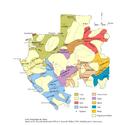Linguistic and cultural diversity are at risk. It is estimated that nearly half of the world's approximately 6,000 languages could die out by the end of the century, with 96 percent of these languages spoken by a mere four percent of the world's population.

The range of vernacular languages in Gabon. Source: Association for the Sustainability and Learning of Gabonese Languages
A vernacular language is the native language or native dialect of a specific population, region or country that is more the language of ordinary speech than formal writing. Every day, a dozen of these vernacular languages disappear. This is alarming, because language plays a vital role in development, in ensuring cultural diversity and intercultural dialogue, and is also critical in strengthening cooperation, building inclusive knowledge societies, preserving cultural heritage and providing quality education for all.
Unfortunately, Information and Communication Technologies (ICT), especially Internet, have so far contributed to the trend towards reduced linguistic diversity, although international organizations such as UNESCO and the Broadband Commission for Digital Development regularly advocate the need for a greater presence of content in local languages.
The online dominance of certain languages is undeniable: at least 80 percent of all content on the Internet is in one of 10 languages: English, Chinese, Spanish, Japanese, Portuguese, German, Arabic, French, Russian, and Korean. African languages are represented on the Internet, but not as a widespread communication medium and often with minimum content in the languages themselves.
So how do we develop a knowledge society based on local content creation and distribution of such content, both locally and globally using broadband services? A workshop held on May 13 in Libreville, Gabon, as an initiative of the country's Ministry of Digital Economy, Communication and Post, helped provide some answers.
With a gross national income per capita estimated at US$10,040 in 2012, Gabon is a middle-income country that is committed to diversifying its economy, largely based on the exploitation of natural resources (especially oil). This favorable economic situation has allowed Gabon to develop an ambitious strategy of developing its digital economy, simultaneously deploying electronic communications infrastructure, as well as content, services and applications, including in vernacular languages.
In Gabon, as in most African countries, daily communications are still largely in the vernacular languages in rural areas, which leads to a phenomenon of Internet underutilization by rural households. This fact remains even though the Internet and ICT in general provide a platform to communicate, learn, manage and disseminate knowledge, especially in the areas of agriculture, education and health in order to promote sustainable socio-economic development. By contrast, vernacular languages are experiencing a significant decline in urban areas, and – in the case of Gabon and many other francophone African countries – are increasingly superseded by French.
